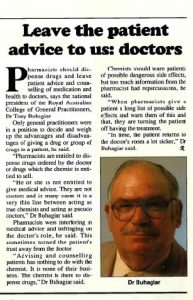In the June issue of Retail Pharmacy magazine, we looked ‘Back in Time’ through the magazine’s archives, comparing the then with the now. We focused on how the pharmacy industry has evolved and how new and old debates continue to develop and advance.
Discussions about pharmacists using their specialised knowledge and training to practice to their full scope have dominated debate around community pharmacy’s future. However, the full scope of practice issue is not new and the objective has been contested throughout the healthcare profession for decades.
In Retail Pharmacy’s second-ever issue, in June 1991, an article titled ‘Leave the patient advice to us: doctors’ highlighted the tensions between GPs and pharmacists on patient advising. Pharmacists argued that they’d been advising for years, but the then national president of the Royal Australian College of General Practitioners, Dr Tony Buhagiar, countered: “Advising and counselling patients has nothing to do with the chemist. It’s none of their business. The chemist is there to dispense drugs.”
Present-day Australia’s healthcare system is facing significant accessibility issues, with GP wait times steadily increasing and almost 20 per cent of surveyed Australians reporting having waited for an unacceptably long time to get a GP appointment.1 Accessibility issues are intensified in rural and regional Australia, where shortages in the health workforce are limiting access to care, despite the greater need for medical services within these areas.2

It is in this environment that full-scope practice for pharmacists is being extended, with pilot programs in Queensland, NSW and Victoria, in that order, aimed at burden sharing and alleviating health access issues. These trials make it clear that full scope is going ahead with or without GPs on board.
Yet as full-scope initiatives continue to roll out across the country, historical tensions between GPs and pharmacists have resurfaced in the modern healthcare environment.
For example, the Australian Medical Association urged the NSW government to abandon the state’s trial of appropriately trained pharmacists treating uncomplicated urinary tract infection (UTI), following a similar trial in Queensland that allowed pharmacists to prescribe antibiotics for UTIs.
“There are critical issues facing general practice, with years of underfunding pushing significant numbers of GPs to retire earlier, while fewer doctors are choosing general practice as a speciality,” AMA President Professor Steve Robson said in a media release.
“Governments need to come to the table with viable solutions to support general practice and build collaborative models of care – not changes that completely undervalue the quality of care that is provided through general practice, and fragment patient care.
“This dangerous [NSW] experiment signals a lack of respect for general practice and the years of training, experience and knowledge required to properly diagnose and treat a medical condition. If implemented in NSW, it will have dire consequences for the future of the workforce.”3
The Pharmacy Guild hit back, calling for the focus to shift to better patient outcomes, dismissing the AMA’s comments as “disappointing, yet not surprising”, and pointing out that pharmacists are qualified professionals, with UTI prescribing undertaken only when additional training is given.
“Appalling and downright degrading” was how Pharmacy Guild Queensland Branch President Chris Owen described the labelling by AMA Queensland (AMAQ) of pharmacists as untrained.
“The need to continually rebut AMAQ’s statements about community pharmacists’ education and training is tiring but necessary,” he said.
“Community pharmacists have undertaken a four-year accredited university degree, a one-year internship, and two registration exams, as well as maintaining annual professional development. Education and training for pharmacists to provide health services within the UTI Pharmacy Pilot – Queensland and North Queensland Pharmacy Pilot is in addition to the years of training and on-the-job clinical experience as a community pharmacist.
“Pharmacists taking part in the North Queensland Pharmacy Pilot are required to undergo further post-graduate level training over a 12-month period, which includes supervised practice hours and a structured clinical exam – not the few hours per week as concocted by AMAQ.”4
Despite scepticism from the medical community, strong consumer support for pharmacists practising to their full scope is apparent in Australia today. A survey conducted in December 2022 by the Consumers Health Forum showed that consumers interviewed as part of ‘Australia’s Health Panel’ were largely in favour of pharmacists being given some prescribing powers, especially within the area of repeat prescriptions.5
Community pharmacy is not only a trusted source of advice but also a health services provider, and it’s clear that pharmacists’ scope of practice will be expanded.
As the debate continues and its complexities emerge, all healthcare professionals should be prioritising high standards of consumer care with patients at the centre. Shifting to a focus on collaborative care in which health professionals are working together, and not apart, should be paramount.
References
- Australian Institute of Health and Welfare. ‘Patient experiences in Australia by small geographic areas in 2019–20’. 2021. aihw.gov.au/reports/primary-health-care/patient-experiences-small-geographic-areas-2018-19/contents/about.
- Australian Institute of Health and Welfare. ‘Rural and remote health’. 2022. aihw.gov.au/reports/rural-remote-australians/rural-and-remote-health.
- Australian Medical Association. ‘Pharmacist prescribing a dangerous proposition which won’t fix workforce issue’. 2022. ama.com.au/media/pharmacist-prescribing-dangerous-proposition-which-wont-fix-workforce-issue.
- Pharmacy Guild of Australia. ‘Sadly, more lies from AMAQ’. 2022. guild.org.au/news-events/news/qld/sadly,-more-lies-from-amaq.
- Consumers Health Forum of Australia. ‘What Australia’s Health Panel said about pharmacy prescribing- December 2022’. 2023. chf.org.au/ahp-pharmacy-prescription.
This feature was originally published in the June issue of Retail Pharmacy magazine.








